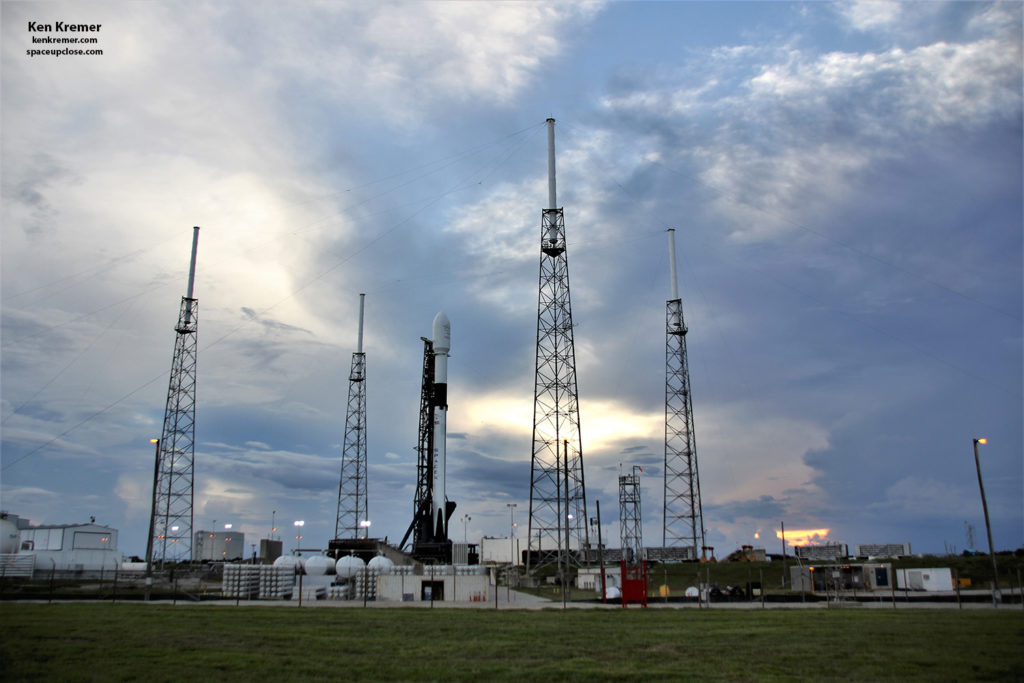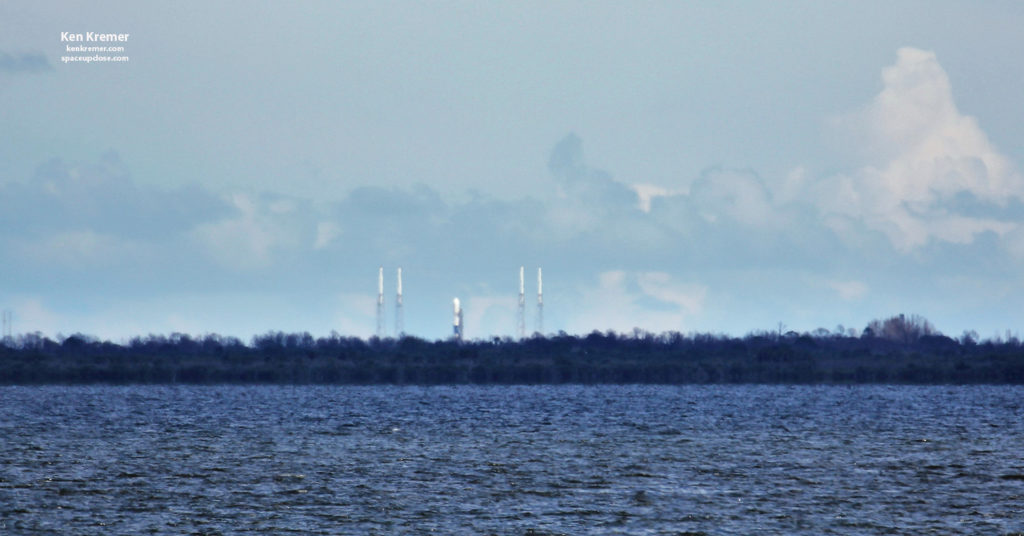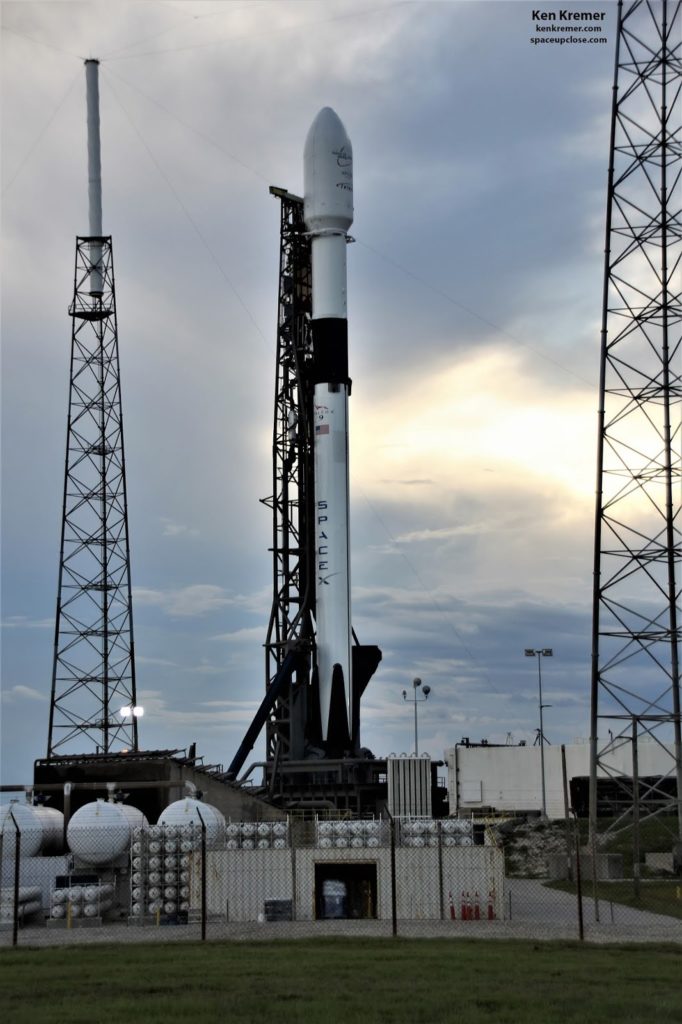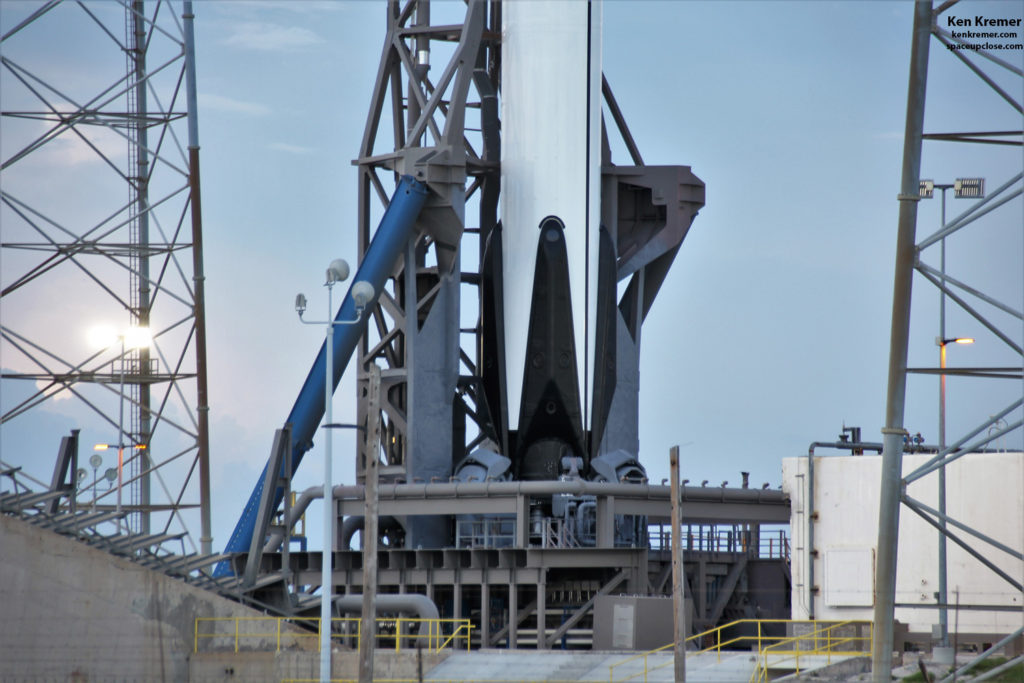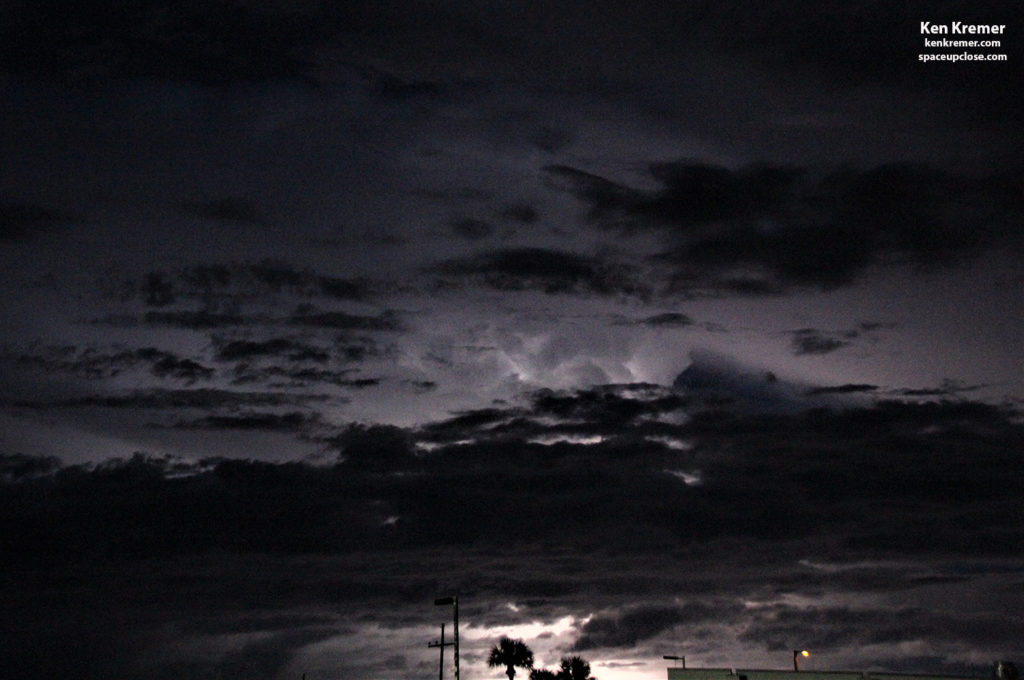Ken Kremer
— SpaceUpClose.com — 9 September 2018
CAPE CANAVERAL AIR FORCE STATION, FL
– A massive Canadian commercial
communications satellite is set for a pre-midnight blastoff late Sunday night
September 9 on an upgraded and newly manufactured SpaceX Falcon 9 booster from
Cape Canaveral, Florida.
Note: Updated with UpClose pad photos from camera setup at sunset Sunday
It Up! The Falcon 9 rocket and
payload was just raised vertical this afternoon around 3 PM, with the nose cone
encapsulating the Telstar 18v glistening beautifully on the afternoon sun.
See my photo above. It was not raised
as of 1 PM today.
Weather is decent at the moment around
the Florida Space Coast.
Liftoff of the hefty 7.7 ton Telstar 18 VANTAGE high
throughput telecommunications satellite (HTS) is targeted for the Sunday night just before midnight at 11:28
a.m. EDT (0328 GMT) Sunday, Sept. 9 on what is only the third production unit of the upgraded Block 5 version of
the Falcon 9 to fly from the Cape and the fourth overall.
Tonights launch was just delayed a day by SpaceX to conduct
additional tests of the rocket to ensure its readiness for flight.
The four-hour long launch window extends until 3:28 a.m. EDT (0728
GMT) on Monday, Sept 10. The long window will help increase the prospects of a
launch. But as always there are no guarantees.
The 7,060 kilograms (15,564 pounds) Telstar 18v is one of heaviest
payload launch by a Falcon 9 to date. The
recently launched Telstar 19v was literally just a tad heavier by some 20 kg, 35
pounds at 7,080
kilograms (15,600 lb).
satellite will be deployed approximately 32 minutes after liftoff. It will be delivered to a
geosynchronous transfer orbit (GTO).
SpaceX will attempt to recover the first stage on an ocean going
droneship prepositioned in the Atlantic Ocean.
If you can’t be here to watch the launch in person, you can watch
the launch live on a SpaceX hosted webcast that starts about 15 minutes prior
to the opening of the nominal launch window at:
cleared on Wednesday afternoon after SpaceX engineers finally completed a
successful static hot fire test of their recently upgraded Falcon 9 booster at about
10 AM.
The new 229-foot tall (70-meter) Falcon 9 rocket
rolled out this afternoon to pad 40 with Telstar 18v
encapsulated inside the payload fairing and was raised
vertical.
Check out our Space UpClose photos of
the raised rocket at the pad taken this afternoon from a distance. Watch for
additional photos later this evening at sunset during our remote camera setup.
Weather
forecasters with the Air Force 45th Space Wing predict a 60 percent
chance of favorable conditions during the window.
The
primary concerns are for the Thick Cloud Layer Rule and the Cumulous Cloud
Rule.
In
case of a delay for any reason a back up launch opportunity exists on Monday, September
10 at about the same time.
The
weather odds remain at 60 percent GO.
Telstar 18 VANTAGE is a Canadian owned commercial
communications satellite, designed as an
advanced high throughput satellite (HTS) providing broadband services.
It will replace Telstar 18.
The huge satellite was built by SSL (formerly Space
Systemes/Loral) for Telesat, one of the world’s leading satellite operators.
Telstar 18 VANTAGE is the third high throughput satellite
(HTS) in Telesat’s global fleet and the first with coverage over the Asia
Pacific region.
“Its innovative payloads will provide Telesat’s customers
with a new level of performance and value to serve growing satellite broadband
requirements on land, at sea and in the air,” according to Telstar.
Telstar 18v
will operate at Telesat’s 138 degrees West location, the same as the Telstar 18
satellite.
It will
serve customers throughout the Asia Pacific region.
Telstar 18v
has a 15 year design lifetime.
This is
the second of two SpaceX launches planned for Telesat over a time space about two
months apart at the Cape.
The Sept 9 night launch will be only
the 5th for the new Block 5 version, and the fourth from the Cape.
The Block 5 Falcon 9 will be cheaper to produce and much
easier to turnaround with minimal maintenance, says SpaceX CEO Elon Musk. His
goal is to relaunch a recovered Block 5 a second time within 24 hours by
sometime next year.
SpaceX will attempt to recover this new Block 5 version of
the Falcon 9 booster which replaces the older, now discontinued Block 4.
The last Block 4 launched in late June for NASA on the
Dragon CRS-15 resupply mission to the ISS.
Watch for Ken’s continuing onsite coverage of NASA, SpaceX, ULA,
Boeing, Lockheed Martin, Orbital ATK and more space and mission reports direct
from the Kennedy Space Center, Cape Canaveral Air Force Station, Florida and
Wallops Flight Facility, Virginia.
Stay tuned here for Ken’s continuing Earth and Planetary science and human
spaceflight news: www.kenkremer.com
–www.spaceupclose.com – twitter @ken_kremer – email: ken at kenkremer.com
Ken’s upcoming outreach events/photos for sale:
Learn more about the upcoming upcoming/recent NASA/ULA Parker Solar Probe,
SpaceX Merah Putih & Telstar 18 & 19 launches, SpaceX Falcon 9/CRS-15
launch to ISS, SES-12 comsat launch, Falcon Heavy, TESS, GOES-S,
Bangabandhu-1, NASA missions, ULA Atlas & Delta launches, SpySats and more
at Ken’s upcoming outreach events at Kennedy Space Center Quality Inn,
Titusville, FL, evenings.
Sep 9: “NASA/ULA Parker Solar Probe launch, SpaceX
Merah Putih & Telstar 18v & 19v Launches, SpaceX Dragon CRS-15 resupply
launch to ISS, SpaceX Falcon Heavy & Falcon 9 launches, SpaceX SES-12
comsat. ULA Atlas USAF SBIRS GEO 4 missile warning satellite, SpaceX GovSat-1,
CRS-14 resupply launches to the ISS, NRO & USAF Spysats, SLS, Orion, Boeing
and SpaceX Commercial crew capsules, OSIRIS-Rex, Juno at Jupiter, InSight Mars
lander, Curiosity and Opportunity explore Mars, NH at Pluto and more,” Kennedy
Space Center Quality Inn, Titusville, FL, evenings. Photos for sale


